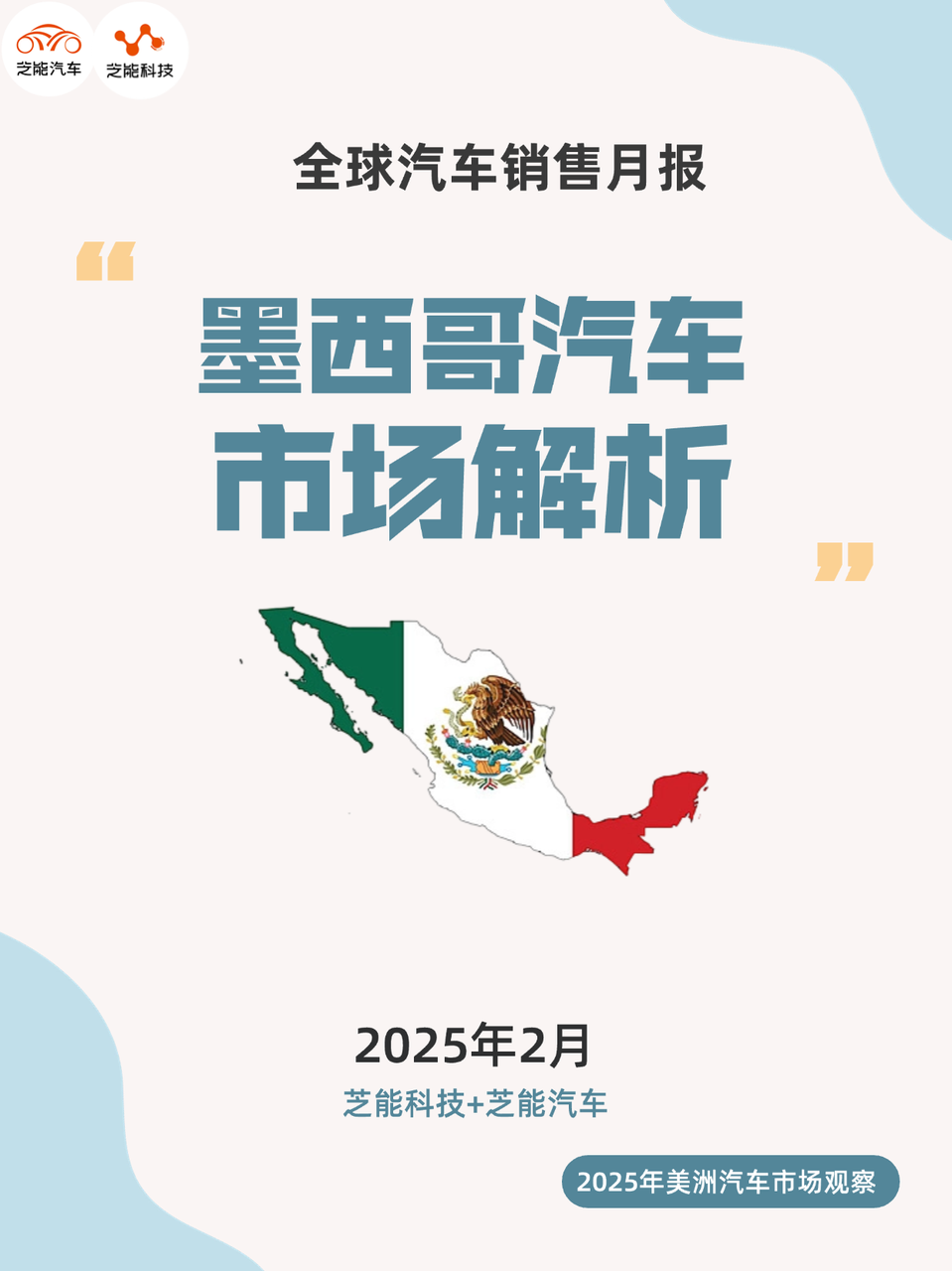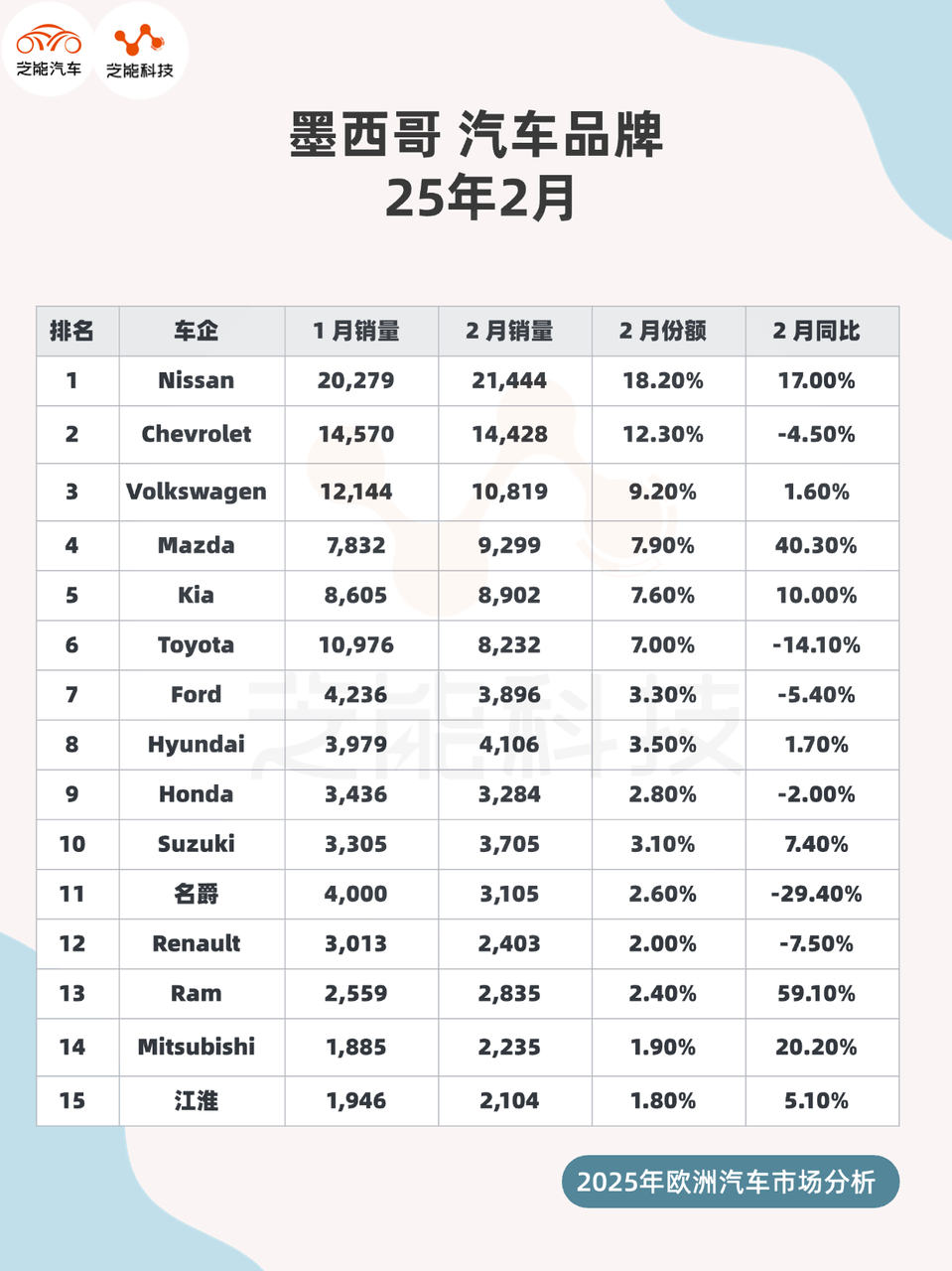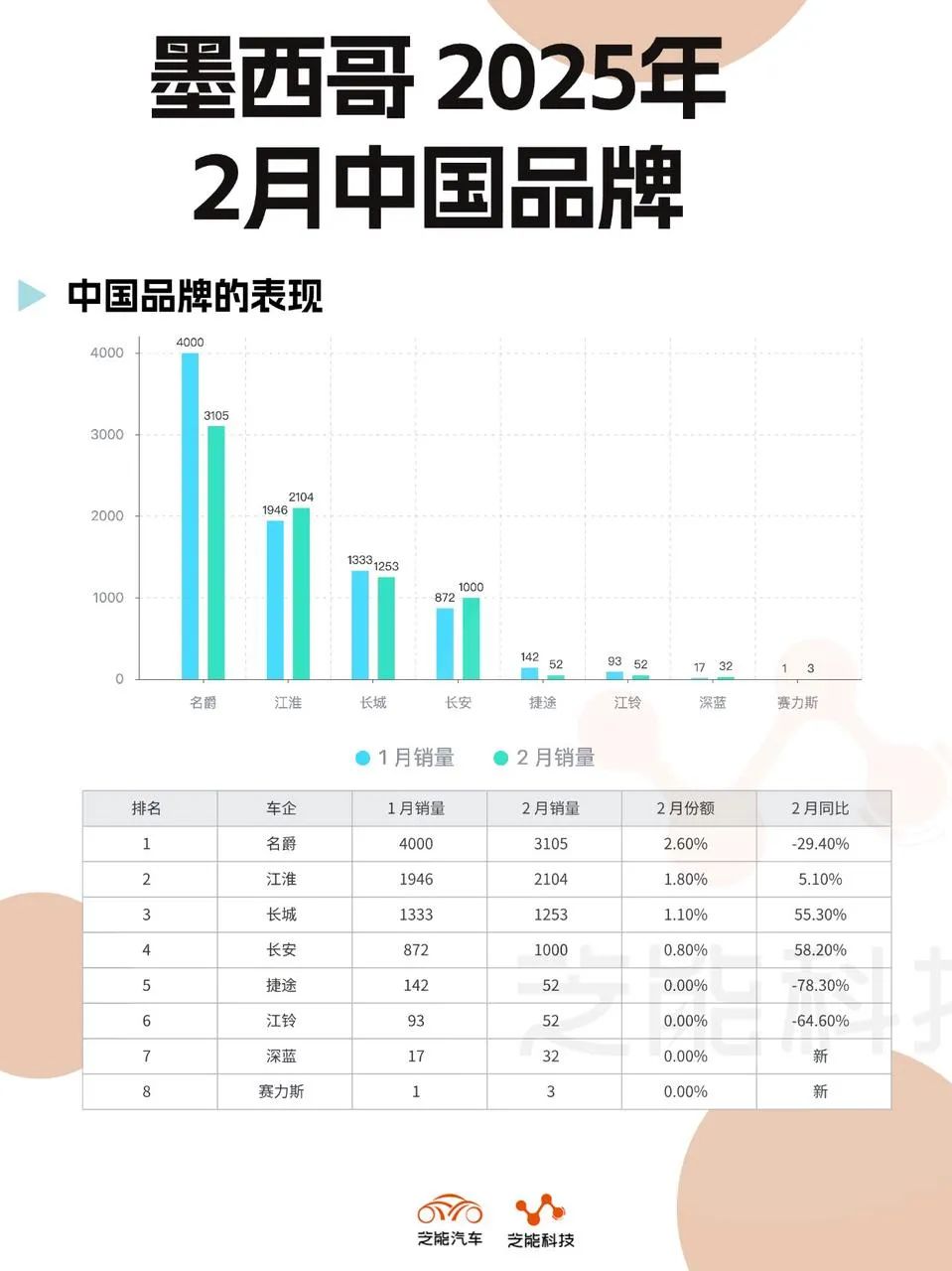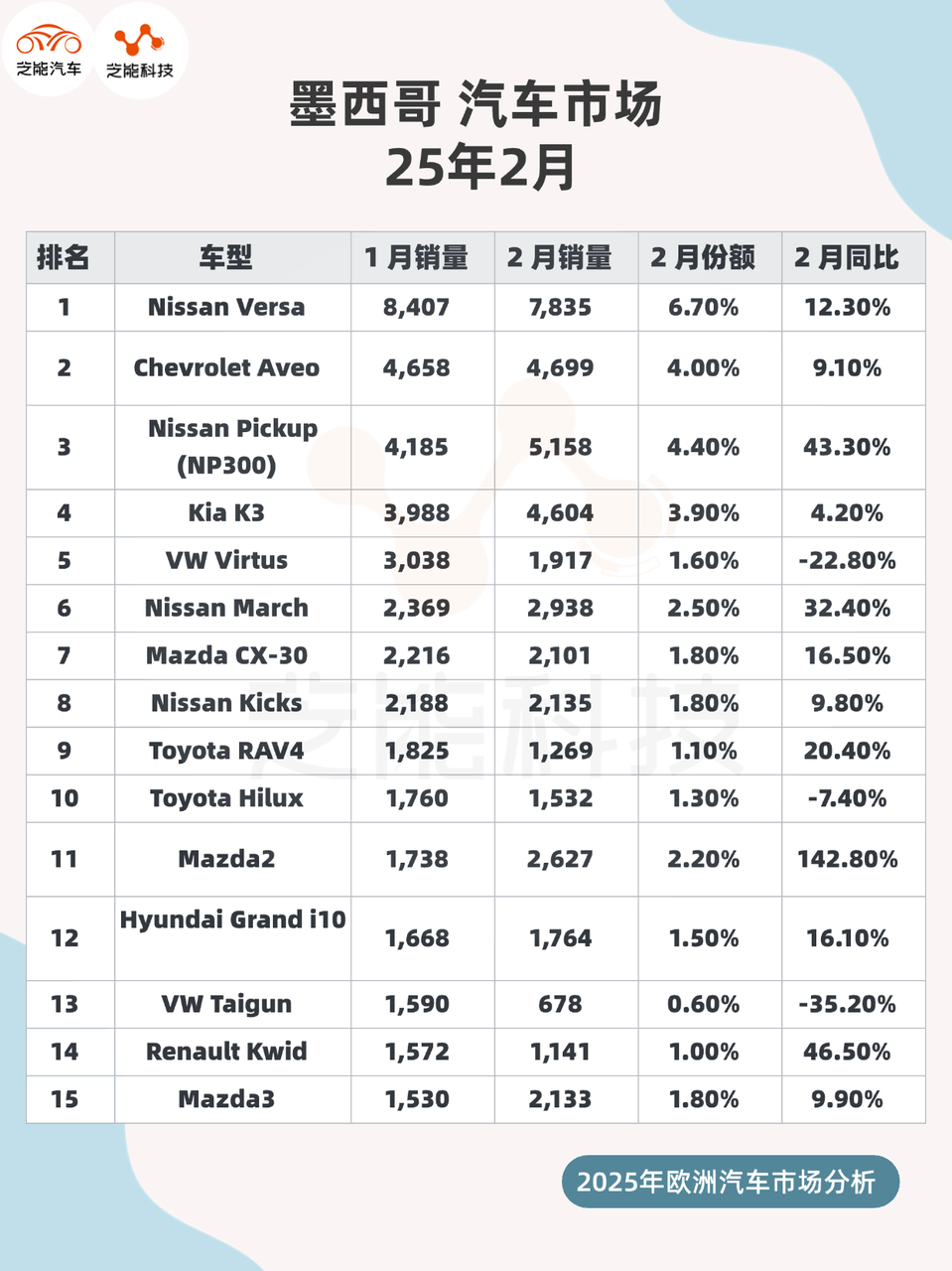North American Auto Market | Mexico February Sales: Steady Growth and Diverse Competition
![]() 03/21 2025
03/21 2025
![]() 597
597

In February 2024, Mexico's new light vehicle market recorded sales of 117,679 units, marking a 2.9% year-on-year increase and setting the second-highest figure for the same period in history, just shy of the 117,985 units sold in February 2017.
Mexico's auto market is gradually stabilizing post-fluctuations. Nissan maintains its lead with a 18.2% market share, up 17% year-on-year, while Mazda stands out with a 40.3% sales surge. Chinese brands such as Great Wall and Changan have achieved growth rates of 55.3% and 58.2% respectively, showcasing a robust upward trajectory.
This article delves into the latest developments in Mexico's auto market, analyzing sales trends, brand performance, and model competitiveness.
01
Mexico's Auto Market Sales Overview
In February 2024, Mexico's new light vehicle sales reached 117,679 units, a 2.9% year-on-year increase, demonstrating the market's resilience amidst global economic uncertainties. This figure approaches the historical high of February 2017 (117,985 units), signaling a gradual recovery in consumer demand.
While the growth rate is modest, the consistent positive trend instills market confidence. Traditional gasoline-powered vehicles continue to dominate, particularly in the economy car and pickup segments.
Electric and hybrid vehicles' penetration rates in Mexico have risen in recent years; however, limited charging infrastructure and high costs hinder faster market share growth.
● Brand performance reveals a mix of established heavyweights and emerging players:
◎ Nissan: With a 18.2% market share, Nissan retains its top position, selling approximately 21,417 units in February (estimated based on market share), a 17% year-on-year increase. Its position as a "home away from home" in Mexico is fortified by its diverse product line and robust localization strategy.
◎ Chevrolet: Holds a 12.3% market share with sales of around 14,471 units, but experiences a 4.5% year-on-year decline, suggesting waning competitiveness, possibly due to product update lags or price strategy adjustments.
◎ Volkswagen: Records a 1.6% market share and sales of about 1,917 units, up 1.6% year-on-year, indicating stable performance.
◎ Mazda: Achieves its best results since November 2023 with sales surging 40.3% year-on-year to 9,301 units and a market share of 7.9%. This significant growth underscores Mazda's success in product design and marketing.
◎ Kia: Ranks fifth with a 10% year-on-year increase, ahead of Toyota (-14.1%), Hyundai (+1.7%), and Ford (-5.4%). Kia's stable performance is fueled by its cost-effective models.
◎ Other Brands: Suzuki outperforms the market with a 7.4% year-on-year increase. Luxury brands Volvo (+89.4%) and Porsche (+66.5%), along with pickup brand Ram (+59.1%), experience notable growth, highlighting niche market vitality.

● Chinese brands have made significant strides in the Mexican market, becoming key players in market competition:
◎ MG: Sold 3,105 units in February, accounting for a 2.6% market share. Despite a 29.4% year-on-year decline, it remains the leading Chinese brand. The sales drop may be attributed to slower product update cycles or heightened market competition.
◎ JAC: Sold 2,104 units, up 5.1% year-on-year, capturing a 1.8% market share, indicating stable growth.
◎ Great Wall: Sold 1,253 units, a 55.3% year-on-year increase, securing a 1.1% market share. This robust growth, particularly in the SUV and pickup segments, underscores its market momentum.
◎ Changan: Sold 1,000 units, marking a 58.2% year-on-year surge and a 0.8% market share. Its cost-effective and localized products contribute to its rapid rise.
◎ Other Brands: Jietu (-78.3%) and Jiangling (-64.6%) experienced significant sales declines, while newcomers Deep Blue and Thalys showed initial potential despite low sales volumes.
Chinese brands' collective performance highlights their cost-effective advantages in the economy car and SUV markets, gradually gaining consumer recognition and room for future growth.

02
Analysis of Model Sales and Competitive Landscape
● In February, Mexico's top-selling models continued to appeal to consumers seeking practicality and economy:
◎ Nissan Versa: Sold 7,835 units, up 12.3% year-on-year, capturing a 6.7% market share. Its affordable price and reliability secure it the top spot.
◎ Chevrolet Aveo: Sold 4,699 units, up 9.1% year-on-year, with a 4.0% market share. It remains favored by budget-conscious consumers.
◎ Nissan NP300: Sold 5,158 units, up 43.3% year-on-year, with a 4.4% market share. This reflects strong demand for pickups in the Mexican market.
◎ Kia K3: Sold 4,604 units, up 4.2% year-on-year, with a 3.9% market share. Its modern design and cost-effectiveness contribute to its top ranking.
◎ Mazda 2: Sold 2,627 units, up 142.8% year-on-year, with a 2.2% market share. It is the fastest-growing model.

Other notable models include the Volkswagen Jetta (+80.5%, 1,917 units), Nissan March (+32.4%, 2,938 units), and Mazda CX-30 (+16.5%, 2,101 units).
Mazda's presence with three models in the top 15 (including Mazda 3, 2,133 units, +9.9%) underscores its competitiveness in the compact car market.
● Mexico's auto market presents a diverse competitive landscape:
◎ Nissan leads with the popularity of the Versa and NP300, reinforcing its dominance in the economy car and pickup segments.
◎ Chevrolet and Volkswagen, while holding significant positions, grapple with growth challenges from emerging brands.
◎ Mazda and Kia rise swiftly through product updates and precise positioning. Mazda's multiple models in the top 15 indicate growing brand influence.
◎ Although no Chinese brand models entered the top 15, their presence in niche markets is significant. Great Wall and JAC are gaining ground in the pickup and SUV segments, while MG maintains competitiveness with its SUV offerings. Through pricing advantages and localization strategies, Chinese brands are gradually penetrating the market.
Summary
In February 2024, Mexico's auto market achieved steady growth with 117,679 unit sales, reflecting consumer demand recovery and market confidence. Traditional brands like Nissan and Chevrolet remain dominant, but the rise of Mazda, Kia, and rapid growth of Chinese brands like Great Wall and Changan have injected new energy into the market. Best-selling models are primarily economy cars and pickups, highlighting practicality as a core consumer consideration.







